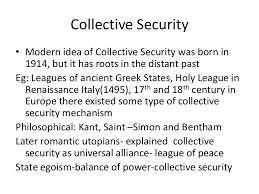Collective Security – Political Science Notes – For W.B.C.S. Examination.
সম্মিলিত সুরক্ষা – রাষ্ট্রবিজ্ঞানের নোট – WBCS পরীক্ষা।
Collective security, system by which states have attempted to prevent or stop wars. Under a collective security arrangement, an aggressor against any one state is considered an aggressor against all other states, which act together to repel the aggressor.Continue Reading Collective Security – Political Science Notes – For W.B.C.S. Examination.
Collective security arrangements have always been conceived as being global in scope; this is in fact a defining characteristic, distinguishing them from regional alliances such as the North Atlantic Treaty Organization. Both the League of Nations and the United Nations were founded on the principle of collective security.
Neither the League nor the United Nations were able to operate the principle successfully to prevent aggression because of the conflicts of interest among states, especially among the major powers. The existence of such conflicts has in fact been recognized in the institutionalized arrangements of the two world bodies themselves: under the Covenant of the League of Nations the response to aggression was left to the member states to decide (article 16, paragraph 3, as amended by interpretive resolutions adopted in 1921); and under the UN Charter any permanent member of the Security Council may veto collective action (article 27)
Collective Security system guarantees the security of each state of the world against any war or aggression which may be committed by any state against any other state. It is like an insurance system in which all the nations are bound to protect the victim of an aggression or war by neutralizing the aggression or war against the victim.
Collective Security is currently regarded as the most promising approach to international peace. It is regarded as a valuable device of crisis management in international relations. It is designed to protect international peace and security against war and aggression in any part of the world.
Collective Security is a device of crisis management which postulates a commitment on the part of all the nations to collectively meet an aggression that may be committed by any state against another. War or aggression is viewed as a breach of international peace and security and collective security stands for collective action by all the nations in defence of peace. Collective security stands for meeting any war or aggression by the creation of a global preponderance of power of all nations against the aggression.
Collective Security is also regarded as a deterrent against aggression in so far as it lays down that the collective power of all nations will be used to repel aggression or war against any state. It is based on the principle, ‘Aggression against any one member of the international community is an aggression against international peace and security. As such it has to be met by the collective efforts of all the nations’
UN Charter includes a system of collective security which is designed to meet an international crisis resulting from war or aggression or a threat of war or aggression in any part of the international system. Balance of Power has lost its relevance as a device of power management and Collective Security has gained recognition as a modern device of power management which can enable the international community to meet a crisis situations.
Nature of Collective Security:
Collective Security stands for preserving security through collective actions. Its two key elements are:
(1) Security is the chief goal of all the nations. Presently the security of each nation stands inseparably linked up with the security of all other nations. National security is a part of the international security. Any attack on the security of a nation is in fact an attack on the security of all the nations. Hence, it is the responsibility of all the nations to defend the security of the victim nation.
(2) The term ‘collective’, as a part of the concept of collective security, refers to the method by which security is to be defended in the event of any war or aggression against the security of any nation. The power of the aggressor has to be met with by the collective power of all the nations. All the nations are required to create an international preponderance of power for negating the aggression or for ending a war.
The underlying principle of Collective Security has been ‘One for All and All for One’. Aggression or war against any one nation is a war against all the nations. Therefore all the nations are to act collectively against every War/Aggression.
Please subscribe here to get all future updates on this post/page/category/website


 Toll Free 1800 572 9282
Toll Free 1800 572 9282  mailus@wbcsmadeeasy.in
mailus@wbcsmadeeasy.in



















































































































